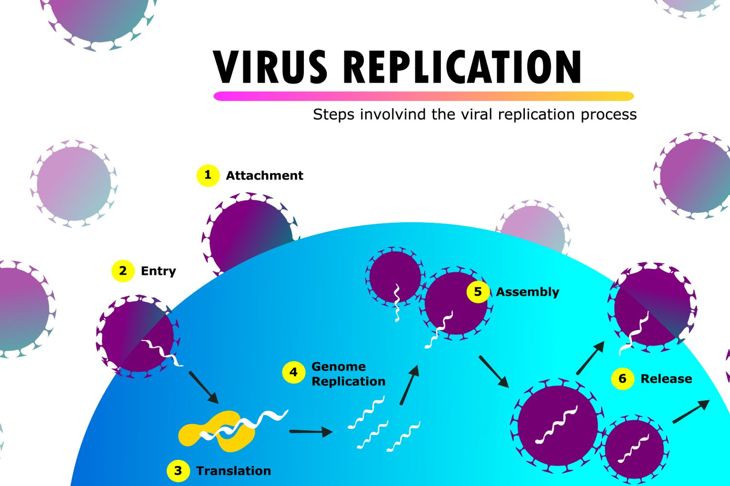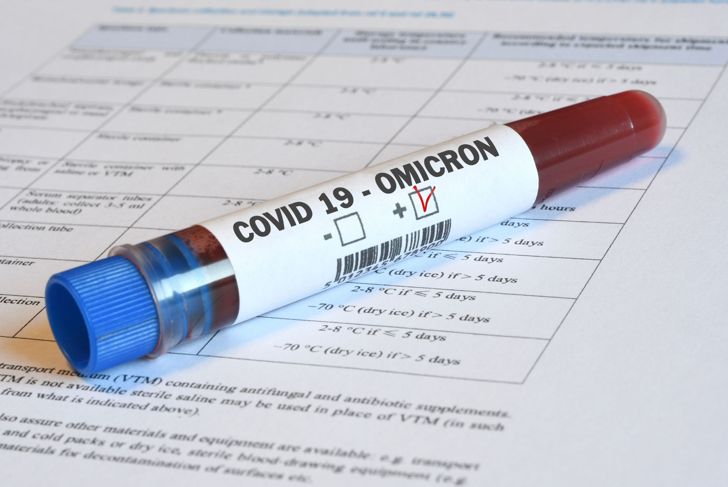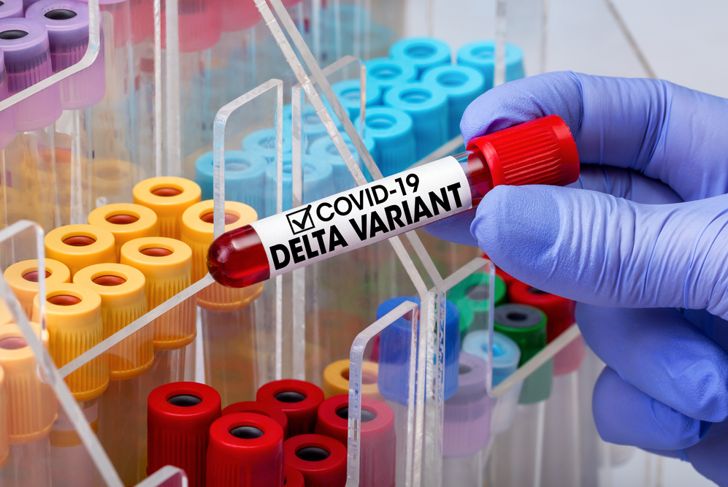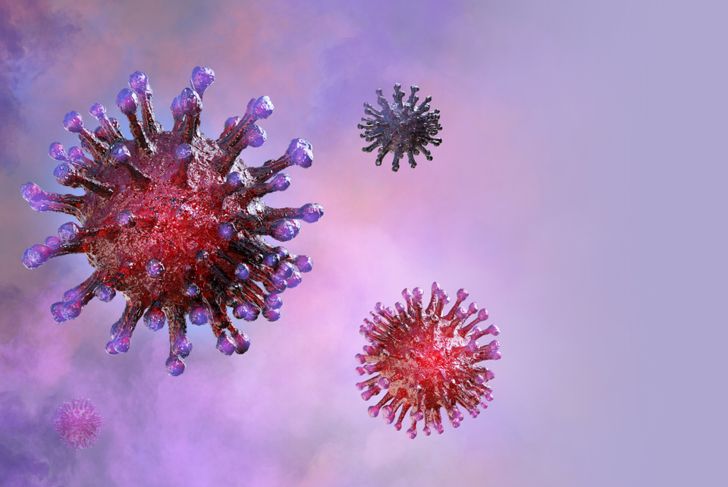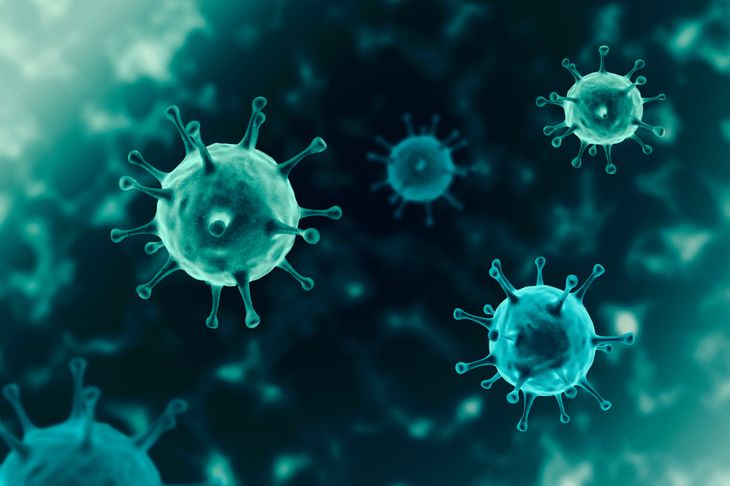In early November of 2021, scientists detected the omicron variant of the novel Coronavirus in South Africa and Botswana. By the end of the month, it was the dominant strain in the region, and cases soon turned up in England, Hong Kong, Italy, Belgium, and Isreal. By mid-December, the omicron variant had spread to North and South America and Australia. Though another variant on top of the recent surge of delta drastically affects the strategy of living with COVID-19, it is normal for viruses to mutate in this way. Some fade away quickly, while others, like omicron, become a variant of concern and warrant closer attention.
Replication
Like all coronavirus variants, omicron results from errors in viral replication. The coronavirus gets its name from its layer of protein spikes, called a corona. It uses these spikes as keys to enter our cells. The spikes engage with receptors on the cell surface, enter the cell, and start replicating. When a virus multiplies, most of the time, it creates an exact copy of itself, but this is not always the case.
Mutations
When a virus replicates, it makes errors that cause mutations. Sometimes, these mutations have little to no effect. Other times, they benefit from the virus. As more errors appear and the virus continues to replicate, mutations add up, changing the way the virus behaves. Omicron is relatively new, and scientists are actively studying it to learn more. So far, research shows that the mutations present in omicron may benefit the virus in multiple ways. It appears to be significantly more infective than delta, which was twice as contagious as the original virus. Omicron may have the potential to evade antibodies acquired from a previous infection, vaccination, or antibody treatment, although more research is needed to confirm this.
Similar Symptoms
According to the World Health Organization, there is currently no information indicating that symptoms from omicron are different or more severe. One reason for this is because many of the early reported cases were in college students, who generally have milder symptoms and are not an at-risk population. Early data also show that hospitalizations increased in South America after the omicron variant began to circulate. But researchers do not know if this is because of increased severity or because omicron spreads so quickly that more people are getting sick. The omicron variant can cause the same symptoms as other variants, including headache, fever, cough, shortness of breath, and sore throat.
New symptoms
Researchers are just beginning to understand the omicron variant. Although many symptoms overlap with delta and previous variants, most of the early cases reported in South Africa had mild symptoms, including severe fatigue with no loss of smell or taste. Because early cases appeared mostly in college students, researchers do not fully understand how omicron will affect other populations, including the elderly and those who are immunosuppressed.
Prognosis
It is too early to tell how the prognosis for omicron varies from delta or any other coronavirus variant. Early research shows that omicron infections in South Africa doubled from 3.2 to 3.6 days over the four weeks ending on December 5, 2021, indicating that it is significantly more transmissible. Another study in Hong Kong indicates that omicron replicated 70 times faster than delta in tissues of the passages that carry air to the lungs. This same study showed that it multiplied ten times less efficiently in lung tissue, which may indicate that it will be less severe.
Vaccine Efficacy
Some vaccines appear to remain effective at preventing severe illness from the omicron variant, although breakthrough infections — infections in vaccinated people — are expected. It is too soon to tell. Research indicates that because omicron has so many mutations, it is likely to evade antibodies. Because the mRNA vaccines elicit a T-cell response, they are still likely to prevent severe infection. Preliminary data show that unvaccinated people are still most at risk of becoming seriously ill.
Other Variants
There are many other coronavirus variants. So far, omicron is the most contagious and is outpacing delta, though it remains to be seen if it is more deadly. New variants are concerning because they mean the virus is changing, and there is a lot that we do not know. It is important to remember that being more deadly is not advantageous to the virus. A virus that kills its host cannot spread, so new variants are not necessarily more severe, but that doesn’t make them less worrisome.
Variants of Interest
Variants of interest have genetic markers that indicate they may affect the body in a different way than previous variants. When this happens, treatments may be less effective, and the virus may be more severe or contagious. When health officials identify a variant of interest, they watch the variant more closely to see if established vaccines and treatments will remain effective.
Variants of Concert
The omicron variant is classified as a variant of concern. It has shown that it is more transmissible. Health officials are now trying to determine if it is also more severe and if current vaccines and treatments are still effective. This classification means that health officials may take more action to slow the spread or increase testing and explore new treatment options if needed.
Controlling Variants
The more infections there are, the more likely the coronavirus is to mutate. With every mutation, the virus may become more transmissible or more severe. The delta variant fueled a massive worldwide surge, and omicron may do the same. The first reported case in the US was on December 1, 2021, and only a few weeks later, there were cases in almost every state. The best way to stop the spread is through vaccination and other measures, like masking, hand washing, and social distancing.

 Home
Home Health
Health Diet & Nutrition
Diet & Nutrition Living Well
Living Well More
More